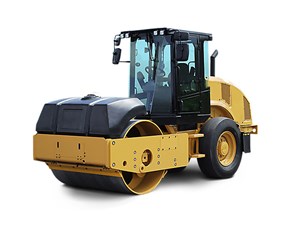Off-Highway Research offers data and analysis on international markets for compaction equipment through its International, Chinese and Indian Database Services, Equipment Analyses from the European, Indian and Chinese Services, Country Analyses from the European Service and Special Reports on emerging markets.
 Compaction equipment
Compaction equipment Off-Highway Research’s coverage of compaction equipment small hand-guided equipment as well as various types of larger ride-on equipment. The main types of compaction equipment within our coverage are:
Hand-guided equipment, including one-way and reversible types.
Sometimes called hand-guided, duplex or walk-behind rollers, they comprise one or two vibrating rollers with a typical width of 650 mm or less.
Equipped with two vibrating drums, these machines are either articulated or have a rigid frame with skid-steering split drums. Typical drum widths are 650-850 mm and they feature remote control to allow them to be used in applications where it would be dangerous or illegal to deploy personnel.
Ride-on tandem rollers have two drums and, depending upon their specification, either one or both drums will vibrate or oscillate. They come in a wide range of sizes from 0.9 to 16.5 tonnes, and are used primarily for compacting asphalt. The frame may be rigid or articulated, and there may be drives to one or both drums. Some models have split drums for better finishing on curves.
Self-propelled rollers, or soil compactors, have a single drum at the front and a driven steering axle with treaded tyres at the rear. The front drum may also be driven. It may be of smooth steel or rubber-coated for asphalt, or pad foot for earth compaction.
Pneumatic-tyred rollers (PTRs) rely purely on their weight and in consequence are ballasted. Their function is to bring the finer particles to the surface of an asphalt mix and to leave a completely smooth surface, which will not ripple as the final vibratory tandem roller, seals it.
Combination rollers, or combi rollers,have one smooth, vibrating steel drum at the front, and a set of smooth rubber tyres at the rear. Combining aspects of PTRs and tandem rollers into a single machine has the attraction of offering both high compaction and a high quality finish.
Towed rollers are usually used with crawler dozers. They carry a small engine to power the vibrator.
Static rollers are non-vibrating and with a single drum on the front and two at the rear. The weight of the machine can be increased by adding ballast such as water, sand or a mixture of both to aid their ability to compact material.
The market is slowing in the short term due to inflation and new emissions regulations, but the medium to long term outlook remains positive
The disruption of the 2019 general election and the impact of the Covid pandemic have seen sales of compaction equipment in India fall away from the high seen in 2018. But the country’s ambitions road building programme should see this peaked matched by 2023.
Sales grew last year in spite of Covid and a further improvement is being seen in 2021
|
KHL Media Limited © Off-Highway Research 2026 All right reserved |
About Us Privacy Policy |
Contact Us Terms & Conditions |